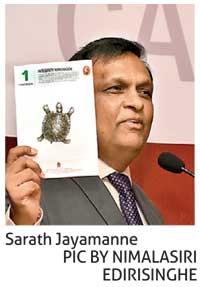Reply To:
Name - Reply Comment
Sri Lanka’s anti-corruption authority is to introduce sweeping legislations to expand its scope to curb corruption stemming from the private sector, while holding public officials, including politicians, more accountable.
Commission to Investigate Allegations of Bribery or Corruption (CIABOC) Director General Sarath Jayamanne revealed that the new proposed amendments to several acts would allow the CIABOC to investigate and charge corrupt practices in the private sector.

He made these remarks addressing a regional forum themed ‘Role of Finance Professionals in Combating Bribery and Corruption’, hosted by the Institute of Chartered Accountants of Sri Lanka, in Colombo, this week.
Jayamanne pointed out that there are currently no provisions in the existing acts to pursue legal action against the corrupt activities in the private sector.
Further, he said that there is a general lack of interest among the private sector officials in coming forward with evidence against corrupt state officials.
“We made a big breakthrough by arresting the Chief of Staff of the President. However, in that incident also, it was a foreign businessman who came forward to provide evidence, not a Sri Lankan businessman,” he remarked.
The draft bill containing the amendments to the outdated anti-corruption acts is expected to be taken up by the Sectoral Oversight Committee on Legal Affairs (anti-corruption) and Media of Parliament, on August 9.
“Not a word has been amended for the last 20-30 years. We are now coming out with a composite law. We hope to receive the draft bill from the Legal Draftsman this week, to submit to the Sectoral Oversight Committee, on August 9. Following the committee approval, the draft bill will be presented to the Cabinet of Ministers,” Jayamanne told Mirror Business.
With the proposed amendments, the scope of asset declaration is set to expand to include all types of assets, expenditure and various income streams.
Jayamanne noted that the existing Declaration of Assets and Liabilities Act doesn’t have the necessary provisions for individuals to declare all types of assets, expenditure, liabilities and income streams and hence, it has created loopholes in the current system, leading to abuse.
“We are only concerned about the assets and few liabilities at the moment. We have to touch on the income and expenditure. Under the current system, you can earn illicit money from various business activities and spend it and close all activities by March 31, before the declaration,” he elaborated.
Jayamanne revealed that the CIABOC plans to set up a new entity named ‘Directorate of Assets Declaration’, which will come under them.
The proposed entity is to be mandated to collect and verify the declaration of assets and liabilities through a centralised electronic submission system, reducing human interaction.
He noted that the CIABOC is already in “serious” discussions with the ICTA on establishing the new centralised electronic submission system.
Further, the new entity will also be connected to the key state agencies, such as Sri Lanka Customs and Inland Revenue Department, to determine suspicious accumulation of wealth.
“During the verification process, if there are any suspicions, the directorate will complain to the CIABOC and we will only then commence criminal investigations. We will utilise asset declarations as a mechanism for investigation and prosecution,” Jayamanne said.
Further, public officials, including politicians, will be required to publicly declare their assets and a list of rules will be introduced to set limits in accepting gifts by these officials.
Speaking of conflict of interest, which leads to corruption among the public sector officials, he lamented that there’s hardly any legal provisions on conflict of interest in the state sector.
However, with the proposed amendments, the public sector officials will be required to such before taking up initiatives.
Further, all state institutes will be required to appoint an ‘integrity officer’, who will be mandated to close down the loopholes in those institutes, which fuel corruption.
“His duty is to evaluate the areas where bribery and corruption grow in that particular institute. He must take steps to pluck those loopholes,” he said.
The CIABOC has already launched an ‘integrity handbook’, which aims to strengthen the role of the ‘integrity officer’.
Jayamanne stressed that while these amendments are introduced, the government must take measures to strengthen the institutes such as the CIABOC, Attorney General’s Department and judiciary to curb corruption.
The CIABOC is currently in the process of recruiting 250 investigators and prevention officers to scale up its investigations and corruption prevention efforts.
The CIABOC drafted the required amendments to the Commission to Investigate Allegations of Bribery or Corruption Act No. 19 of 1994, Bribery Act No. 11 of 1954 and Declaration of Assets and Liabilities Act No. 1 of 1975, with the consultations of a wide range of stakeholders, including the World Bank. (NF)